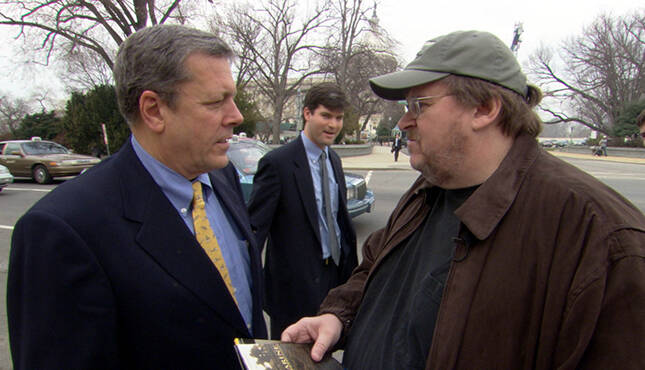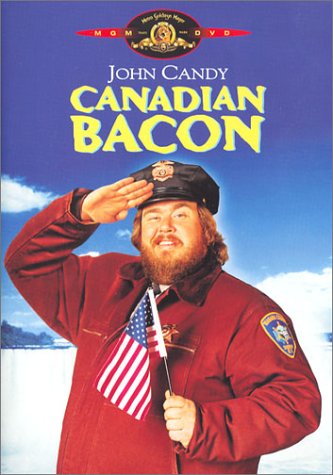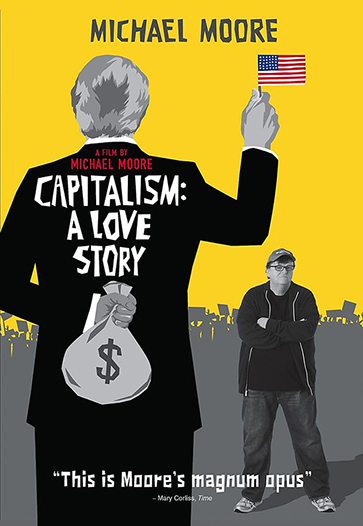Movies & TV / Columns
The Top 8 Movies of Michael Moore
 Image Credit: Lionsgate
Image Credit: Lionsgate
The Top 8 Movies of Michael Moore
I’ve been a fan of writer/director/political commentator Michael Moore since I first saw his first V show TV Nation, which, at the time I was made aware of it, aired on Fox (the second season of the show aired on Fox. The first season aired on NBC). I had no idea that Moore was also a documentary maker until I saw his first documentary Roger & Me, totally by accident, on cable (I think it was HBO). Moore also write a book that came out in 1996, Downsize This! Random Threats from an Unarmed American, which I took out of the library but never purchased (and still haven’t purchased, although I have most of his other books. I don’t really know why I don’t own Downsize This! as I enjoyed it quite a bit). Since 1989 and Roger & Me, Moore has directed at least eleven documentaries, one narrative movie, produced two TV shows (TV Nation and The Awful Truth), written several more books, and has managed to annoy God knows how many people, both right wingers and left wingers and plenty of people in between. He doesn’t seem to have the same presence as he used to (he isn’t on the political chat shows as much as he used to be, at least as far as I’ve seen, and he hasn’t made a new documentary since 2018. I’m shocked one of the streaming services haven’t tried to get into business with him) but he’s still out there doing things (I believe he does a podcast now).
So what are his eight best movies? What are the Michael Moore movies that you should make an effort to check out? And why am I only ranking eight of his eleven movies?
Well, all of his movies are worth checking out, but I thought, for the purposes of this list, I’d write about the ones that I think are the absolute best he’s done so far. And that list came out to eight movies.
So what are Michael Moore’s Top 8 Movies?
The Top 8 Movies of Michael Moore

8. Canadian Bacon: Moore’s only narrative/fiction movie, Canadian Bacon is a comedy that’s probably best known as star John Candy’s last released movie (Candy made Canadian Bacon before Wagon’s East, his actual last movie that he worked on). The movie is a wicked satire on how a possible “new Cold War” could be started between the United States and Canada, with a weak U.S President (played by Alan Alda) trying to bump up his low approval rating by conjuring up a new enemy for America (Alda’s president character at first tries to get the Russians to do a sort of “Cold War sequel” but they refuse to participate). Candy plays Bud Boomer, an American cop who starts a riot at a hockey game in Canada when he makes fun of Canadian beer and who then, in the ensuing chaos caused by the “American/Canadian Cold War,” leads a team of his friends into Canada to rescue his wife (played by a batshit Rhea Perlman) after he believes she’s been kidnapped by the Canadians. There’s also a scumbag arms dealer played by G.D. Spradlin, a slimey National Security Advisor played by Kevin Pollak, and a slew of funny cameos (Steven Wright plays a Mountie, Jim Belushi plays a TV news reporter on the “front lines,” Dan Aykroyd plays a super helpful Canadian bike cop, and Moore himself pops up as an American waving an M-16 and celebrating Bud Boomer). The best performances in the movie, besides Candy (he’s so goddamn brilliant as Bud Boomer) belong to Brad Sullivan as a CIA agent that hates Canada (his whole speech that ends with a complaint about Canadians using the metric system gets me every time) and Rip Torn as an American general that has absolutely no problem nuking Canada off the face of the Earth. The movie was a flop when it was released (I’m not sure what sort of theatrical release it received as I first saw it on cable) but it’s developed a sort of cult audience since then. It’s a shame that it wasn’t a bigger hit as I’m sure Moore would have tried to make more “regular” movies if it had made money. Even if you don’t dig the movie’s (and Moore’s) politics, as a spoof it works well, too, because the premise of the movie and the way it plays out is so damn absurd.

7. Sicko: Sicko is Moore’s examination of the U.S. healthcare industry and how it compares to health care systems around the world. While the movie’s depiction of healthcare systems around the world is probably too simplistic (you can go online and find loads of people complaining about healthcare in Canada, the United Kingdom, and France, among other places with “socialized healthcare.” And it’s depiction of healthcare in Cuba is suspect as hell, too, although I’ll explain why I think it’s in the movie later), Sicko does a great job explaining how terrible the American healthcare system is for people who can “afford it” but get screwed over by insurance companies, not to mention the politicians of both parties who are essentially owned by those insurance companies. Healthcare is seen as a business throughout the movie, just another scheme to make money, which is just devastating for the people destroyed by that system. As for the section on healthcare in Cuba, I think it’s in the movie not so much because Moore wants you to believe that Cuban healthcare is better, but that the people with lingering health issues from the 9/11 terrorist attacks in New York City were able to get the help they needed in evil Cuba when they couldn’t get the help they needed in America. The movie wants you to be outraged by that. At least that’s what I took from what happens. I’d love to see Moore make a sequel to this in the age of Obamacare.

6. Fahrenheit 9/11: Moore’s most financially successful documentary, it was released to much fanfare and controversy back in 2004, when Disney wouldn’t allow Miramax to release it to theaters and, as a result, had the Weinstein Brothers create a new company just to release the movie (the company was called Fellowship Adventure Group and, according to Wikipedia, Fellowship teamed up with Lionsgate to release the movie in the United States). The movie is Moore’s attempt to explain the real origins of the 2003 Iraq invasion and what a complete disaster it was for Iraq, the United States and the world as a whole, while also criticizing George W. Bush, the then alleged President of the United States (and you read that right. Al Gore won the 2000 election but was screwed out of it by the Supreme Court so, to me and my evil leftist mind, Gore was the real and elected but screwed over President back then). Moore hoped that the movie would somehow convince people not to vote for Bush in the 2004 presidential election and that the movie would act as a sort of rallying cry for that. Unfortunately for Moore, America, and the world, Bush was actually elected to office in 2004, so in that sense the movie failed. But as a searing indictment of a war/invasion and a U.S. President? No one else has come close.

5. Roger & Me: Moore’s first documentary is an examination of what happened to his hometown of Flint, Michigan after General Motors closed the car manufacturing factory that was the economic backbone of the area. To say that it isn’t a pretty picture would be a severe understatement as the plant’s closing devastated Flint. Moore talks to several people/constituencies throughout the documentary: people destroyed by the plant’s closing (we see several people evicted from their homes), people who have to deal with those people (like the sheriff’s deputy we see issuing the eviction notices), people who are just “trying to survive” (the infamous “Pets or Meat” rabbit lady), people who try to establish new careers among the wreckage (the “color analyzing” woman), and assorted assholes who are either paid to be an asshole (like that GM PR spokesman who tells Moore that GM’s job is to make a profit and nothing more) or who are just rich and don’t give a shit about poor/non-rich people. Moore also attempts to interview Chairman Smith, which he never really gets to (Moore does talk with Smith, very briefly, at the end of the movie, but it’s a quick conversation and Smith refuses to do an actual interview or go to Flint to see what his decision did to the town). The movie will make you sad, make you laugh, and make you mad, which is what Moore likely wanted the movie to do. The movie also manages to enshrine game show host and Flint native Bob Eubanks telling a super offensive joke about Jewish women and AIDS, so it has that going for it, too. If you’re interested in the movies of Michael Moore you should definitely start with Roger & Me.

4. Fahrenheit 11/9: Moore’s last documentary to date, Fahrenheit 11/9 serves as a sort of “spiritual sequel” to Fahrenheit 9/11 as it’s meant to enrage it audience about the then President of the United States, which was (Jesus Christ) Donald Trump at the time the movie was made. And while it’s true that Moore hammers Trump for his performance as the commander-in-chief and what he’s all about (in short, it’s nothing good), the most devastating part of the movie is Moore’s takedown of Trump’s predecessor Barrack Obama and how his inaction on the Flint water crisis might have led to Hillary Clinton losing Michigan in the 2016 Presidential election. I’d suspect that the Obama section of the movie is why Fahrenheit 11/9 didn’t generate as much controversy as Fahrenheit 9/11 did (liberals weren’t going to support anything that put Obama in a bad light, even if what was shown is absolutely true, and right wingers certainly weren’t going to support Moore because of Moore’s entire career slamming them and, again, it’s not like 11/9 doesn’t hammer Trump, too). The movie didn’t make much money at the box office and sort of came and went on home video, but it’s worth tracking down and checking out. The movie is a very good example of how Moore, even if he’s an avowed leftist of some sort, he has absolutely zero qualms about trashing people “on his side” if they do bad shit.

3. Capitalism: A Love Story: While it isn’t advertised as such, Capitalism: A Love Story is a sort of sequel to Moore’s first movie Roger & Me (Moore did do a short film sequel to Roger & Me called Pets or Meat: The Return to Flint, so there is a “proper” sequel to Roger & Me if you’re interested) as it deals with the same basic themes: relentless greed, the poor and middle class getting screwed over by the mega rich, there are politicians owned by the mega rich and they come from both major parties. It’s a bit scatter shot in terms of focusing on any one area of the country, as Moore comments on people and events from across the country (the section on the for profit juvenile prisons in Pennsylvania is infuriating and a great subject someone like Moore could do an in depth documentary on. There are tons more like that). Moore does get back to what happened to the family thrown off their family farm at the beginning of the movie (and it will piss you off). And there are some uplifting moments, like when the workers at the various plants band together and eventually get what they want (and the businesses that run via democracy are something you rarely hear about in the mainstream “liberal” media). The most scathing section, though, is the one about the 2008 bailout. The section about President Obama is a bit too optimistic in retrospect (he wasn’t the radical he was made out to be by the Republicans, the right wing media, and the mainstream media) but it’s still hopeful. And the believed missing FDR film clip about a second bill of rights is something to aspire to, or at least it should be. The biggest laugh in the movie, though, is a split between Moore trying to get someone to explain to him (and the audience) what a derivative is and the montage at the beginning of the movie where we see Ronald Reagan smack a woman in the face.

2. Bowling for Columbine: This is the first Moore documentary that I saw in a movie theater. I was shocked that it played anywhere near me and, in a bigger sense, got as big of a theatrical rollout as it did. The movie is an examination of America’s gun culture and its subsequent “gun problem.” While it’s true that the movie does advocate for gun control I think it’s wrong to say that that’s what the movie is about. Moore takes a look at other Western industrialized nations and tries to figure out why they don’t have the same sort of gun violence and gun death issues that we do: they all have mental health issues, they have access to the same violent Hollywood movies and TV shows and music as Americans do, and many countries also have rampant gun ownership and gun cultures (like Canada), so why don’t they have as many people die from gun violence? The movie is actually more interested in ultimately advocating for a change in America’s culture of fear, which is exacerbated by politicians, interest groups like the NRA, and big business. Those influences, according to Moore, are the real problem in America. Again, Moore is all for gun control/expanding gun control, but the movie doesn’t really advocate for “taking everyone’s guns away.” It’s really more interested in finding a way to stop the horseshit from the business world: stop making people afraid simply so you can sell them something. It’s just wrong. Moore’s eventual interview with Heston towards the end of the movie was heavily criticized when the movie came out because Heston was supposedly at the beginning of Alzheimers when he met with Moore, but if you watch the interview there’s no way you would know that unless Heston told you because he’s cogent and, well, Charlton Heston, movie star throughout. He’s older, yes, but it’s not like he’s showing any cognitive difficulties. It isn’t Moore’s fault that Heston ends up looking like a fool and an asshole. Bowling for Columbine won the 2003 Oscar for Best Documentary and was eventually given the Criterion Collection treatment in 2018. Out of all of the documentaries Moore has made to get the Criterion treatment I’m surprised that Roger & Me wasn’t the first.

1. The Big One: Moore’s second feature length documentary as a director, The Big One is easily Moore’s loosest movie as he had to basically cobble it together after the fact. While promoting his first book, Downsize This! Random Threats from an Unarmed American, Moore took along a small crew to film the various author events his publisher Random House put together and the random events that Moore agreed to participate in from fans who want his help (like employees from a grocery store that want his advice on how to start a union). Some of his handlers are okay with the schedule wrecking while others just deal with it (he’s a superstar author doing a book tour. How are they going to control him?). We see some typical/classic Moore bits, like going to local corporate headquarters to present “awards” only to be thrown off the property mixed in with some book reading moments and interviews with people like Studs Terkel. The big hooha moment is the interview Moore managed to get with then Nike CEO Phil Knight (Knight agreed to the interview after his wife showed him his “appearance” in Moore’s book), the small video Moore then made in Flint, Michigan featuring Flint residents in an attempt to convince Knight to bring a Nike shoe plant to Flint, and Knight eventually poopooing the idea (he would have to pay Americans a non-slave wage so, yeah, he ain’t gonna do that). My favorite part of the movie is the bit where Moore explains how he almost got arrested during one of his “stunts,” telling the cops “Wait, you can’t arrest me! I’m on a book tour!” I saw this documentary on cable, recorded it, and then wore out the tape. I wish this documentary was easier to get and shown more often, both on cable and streaming. Out of all of the documentaries that he’s done it’s easily his funniest and most rewatchable. Track it down and check it out if you haven’t seen it. Definitely worth your time. And see if, after watching, you ever want to eat a Payday candy bar again.
**
Thanks for reading. Agree? Disagree? Sign up with disqus and comment. You know you want to, so just go do it.
Please “like” The Gratuitous B-Movie Column on Facebook!







